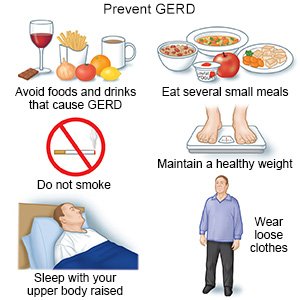GERD (Gastroesophageal Reflux Disease)
Medically reviewed by Drugs.com. Last updated on Aug 4, 2025.
Gastroesophageal reflux disease (GERD) is reflux that happens more than 2 times a week for a few weeks. Reflux means acid and food in your stomach back up into your esophagus. GERD can cause other health problems over time if it is not treated.
 |
DISCHARGE INSTRUCTIONS:
Call your local emergency number (911 in the US) if:
- You have severe chest pain and sudden trouble breathing.
Seek care immediately if:
- You have trouble breathing after you vomit.
- You have trouble swallowing, or pain with swallowing.
- Your bowel movements are black, bloody, or tarry-looking.
- Your vomit looks like coffee grounds or has blood in it.
Related medications
Treatment options
The following list of medications are related to or used in the treatment of this condition.
Call your doctor or gastroenterologist if:
- You feel full and cannot burp or vomit.
- You vomit large amounts, or you vomit often.
- You are losing weight without trying.
- Your symptoms get worse or do not improve with treatment.
- You have questions or concerns about your condition or care.
Medicines:
- Medicines are used to decrease stomach acid. Medicine may also be used to help your lower esophageal sphincter and stomach contract (tighten) more.
- Take your medicine as directed. Contact your healthcare provider if you think your medicine is not helping or if you have side effects. Tell your provider if you are allergic to any medicine. Keep a list of the medicines, vitamins, and herbs you take. Include the amounts, and when and why you take them. Bring the list or the pill bottles to follow-up visits. Carry your medicine list with you in case of an emergency.
Manage GERD:
 |
- Do not have foods or drinks that may increase heartburn. These include chocolate, peppermint, fried or fatty foods, drinks that contain caffeine, or carbonated drinks (soda). Other foods include spicy foods, onions, tomatoes, and tomato-based foods. Do not have foods or drinks that can irritate your esophagus, such as citrus fruits, juices, and alcohol.
- Do not eat large meals. When you eat a lot of food at one time, your stomach needs more acid to digest it. Eat 6 small meals each day instead of 3 large ones, and eat slowly. Do not eat meals 2 to 3 hours before bedtime.
- Elevate the head of your bed. Place 6-inch blocks under the head of your bed frame. You may also use more than one pillow under your head and shoulders while you sleep.
- Maintain a healthy weight. If you are overweight, weight loss may help relieve symptoms of GERD.
- Do not smoke. Smoking weakens the lower esophageal sphincter and increases the risk of GERD. Ask your healthcare provider for information if you currently smoke and need help to quit. E-cigarettes or smokeless tobacco still contain nicotine. Talk to your healthcare provider before you use these products.
- Do not put pressure on your abdomen. Pressure pushes acid up into your esophagus. Do not wear clothing that is tight around your waist. Do not bend over. Bend at the knees if you need to pick something up.
Follow up with your doctor or gastroenterologist as directed:
Write down your questions so you remember to ask them during your visits.
© Copyright Merative 2025 Information is for End User's use only and may not be sold, redistributed or otherwise used for commercial purposes.
The above information is an educational aid only. It is not intended as medical advice for individual conditions or treatments. Talk to your doctor, nurse or pharmacist before following any medical regimen to see if it is safe and effective for you.
Learn more about GERD
Treatment options
Care guides
Symptoms and treatments
Medicine.com guides (external)
Further information
Always consult your healthcare provider to ensure the information displayed on this page applies to your personal circumstances.
